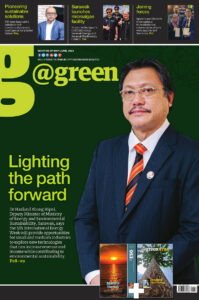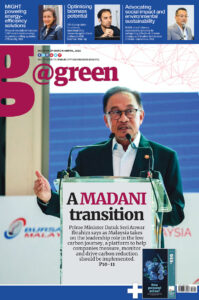City Expo Malaysia 2021 recorded more than 30,000 booth visitors
BY FATIHAH MANAF
With emerging global issues such as climate change and rapid urbanisation, cities are becoming more and more vulnerable.
During the closing ceremony of City Expo Malaysia (CEM) 2021, Malaysian Institute of Planners (MIP) President Datin Noraida Saludin said this during her speech and launch of the logo for MIP’s 50th anniversary. She shared the organisation had a humble beginning and never forgot its roots and objective to promote the science and arts of town planning for the benefit of the public.
“City Expo Malaysia is one of MIP’s ongoing efforts in engaging and educating the people of the importance of being part of the process in shaping the future of cities, shaping their own destiny as mankind,” stated Noraida.
CEM 2021 wrapped up its one-month virtual exhibition on Nov 8, 2021. The event, organised by MIP and Nextdor Property Communications, began with a four-day insightful forum featuring prominent speakers. The discussions involved a wide range of topics from cities to sustainability.
In total, the expo had gathered 4542 registered participants from 53 countries and featured 51 exhibitors. The total number of forum viewers was 11017, with an average of 2500 participants attending it per day. A total of 32998 booth visitors were also recorded visiting the expo, exceeding the organiser’s initial target of 10000 visitors.
CEM Chairman Ihsan Zainal Mokhtar, in his closing speech, said: “Despite the challenges, CEM 2021 has proven to be a resilient tool during the pandemic, enabling users to engage, explore and learn from one another despite distances, time zones and backgrounds.”
He hoped the event left memorable impressions for speakers and participants and would continue to be well-organised, supported and fully utilised in the future as a common educational platform for city-related solutions.
Some of the expo exhibitors were UN-Habitat, Iskandar Regional Development Authority (IRDA), AJM Planning & Urban Design Group, Urban Scale Studio Sdn Bhd and Commonwealth Association of Planners.
Getting to know Kuala Lumpur
Kuala Lumpur was granted city status on Feb 1, 1972. The city has evolved over the years and many new initiatives have been introduced in the past year to move Kuala Lumpur towards an inclusive, sustainable, resilient, and progressive city.
As the strategic partner of CEM 2021, Kuala Lumpur City Hall (DBKL) had a unique programme during the event entitled ‘DBKL Branded Content Day’, a day aimed at getting participants to know more about the city.
The first presentation during the special programme was delivered by Datuk Seri Mahadi Che Ngah, the Mayor of Kuala Lumpur. The title of his presentation was ‘100 Years of Kuala Lumpur’s Sustainability Journey & Challenges’.
Like all cities worldwide, Kuala Lumpur has faced many urban challenges that have shaped the city’s current landscape. Some of the challenges include frequent floods, notably in 1902 and 1917, economic recession, and continued population growth.
“In proactively addressing this issue (population growth), and as a part of our efforts to ensure all citizens have access for shelter, DBKL built numerous low-cost public housing over the years to accommodate squatters as well as low-income citizens,” said Mahadi.
“In addressing the needs of our growing city, KL Sentral was developed to become a public transportation hub for the city.
At the same time, it also connects Kuala Lumpur to the KL International Airport (KLIA).”
He noted the city stood firmly as the central point of employment, education, start-up businesses and other growth prospects. Mahadi believed effective urban planning was vital in addressing urban issues in Kuala Lumpur.
“Most importantly, it is key to establishing a more sustainable future and realising our new vision of Kuala Lumpur as a city for all.”
He revealed Kuala Lumpur had reaffirmed its strong commitment towards reducing 70 per cent of carbon emissions by 2030 and achieving carbon neutrality by 2050. With this bold commitment in mind, DBKL had introduced several strategic blueprints and master plans over the years in driving the carbon neutrality target.
“The Draft Kuala Lumpur Structure Plan 2040 (KLSP2040) was introduced in March 2020 with a vision of developing Kuala Lumpur into a city for all, with an emphasis on sharing, inclusivity and equality.”
In executing its action plans, DBKL implemented some green and low mobility initiatives in the city, such as:
• Solar panels installation (Eg: IKEA Cheras, DUKE Plaza Tol)
• Rainwater harvesting system
• Improving solid waste management
• Urban farming
• Extensive rail network
• KL car-free morning
“In line with City Expo Malaysia 2021’s theme of 100 years advancing our cities, the hope is we will not only celebrate our achievements but continue to collectively seek out solutions. Together, let us create a greater Kuala Lumpur, one that is more liveable.
Other speakers during the programme included Datuk Sulaiman Mohamed, Executive Director (Planning) of DBKL; Datuk Azmi Abdul Hamid, Executive Director (Project Management) of DBKL; Datuk Sr Kamarulzaman Mat Salleh, Executive Director (Management) of DBKL; Anwar Mohd. Zain, Executive Director (Socio-Economic Development) of DBKL.
The DBKL Branded Content Day also featured pocket talks from Ismail Abdullah, President & CEO of International Green Training Centre; Dr Nurfashareena Muhamad, Research Fellow in Universiti Kebangsaan Malaysia; Dr Azmizam Abdul Rashid, Deputy CEO of Urbanice Malaysia and Mariana Isa, Co-Director of Heritage Output Lab. — @Green








